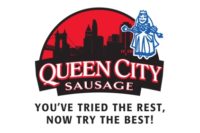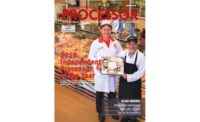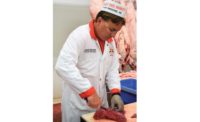In 1965, Queen City Sausage was a fledgling sausage company in Cincinnati, a city full of established, well-known processors. The founder of Queen City was a 35-year-old Cincinnati native who had spent the majority of his life to that point in the city’s slaughterhouses. Almost 50 years later, Queen City Sausage has become one of the most iconic brands in a city that takes its local foods very seriously. Its founder, Elmer Hensler, can still be found in the office every day, making sure the company is adhering to his strict quality standards.
“I believe in making a quality product, I believe in using quality meat, I don’t deviate, I don’t use any mechanically separated chicken or turkey like some of the other fellas do,” he says. “I believe in giving quality and keeping the quality up. That’s why I think I’m still here for 49 years, going on 50. If you give the public quality product, they’ll buy it and be grateful that you have it.”
Even as Queen City Sausage has grown and expanded its operations into new products and new processes, the basic tenants that Hensler set down at the very beginning are still in use. Along with using only the best ingredients, the spices are hand-mixed — by Hensler’s younger brother, Art — and real hickory wood is used in all the smokehouses.
There is no denying that Queen City Sausage, and its founder, is one of the industry’s great success stories. Even today, the company’s most popular products are time-tested favorites like brats, metts and smoked sausages. However, it would be a mistake to write the company off as a museum piece. Queen City Sausage is an important part of Cincinnati’s present-day community. Not only can its products be found in supermarkets and restaurants throughout the city, but the company is a mainstay at public events, from charity runs to baseball games. It also hosts its own Queen City Sausage Festival each July. With a storied past and a bright future, Queen City Sausage is the most deserving recipient of Independent Processor’s first-ever Processor of the Year Award.
From the bottom to the top
In the 19th century, Cincinnati’s thriving meatpacking business had given the city the nickname of “Porkopolis”. While the packing and processing business in Cincinnati had diminished by the 1940s, there were still plenty of opportunities for a kid from the West End of town to find his future career.
“When I was about 11 years old, I started hanging around the slaughterhouse,” Hensler recalls. “The next thing you know, I’m in the slaughterhouse, because I was fascinated by the way the cattle were killed, and the calves and the lambs. So before I went to school, I would go to work and help put out the orders.”
Hensler spent his days getting up at 4:00 in the morning, working at the slaughterhouse for a couple of hours before going to school, and returning to the slaughterhouse after school. Mark Balasa, Queen City’s director of marketing, points out that he wasn’t getting paid at first.
“He was showing them that he wanted to work, and it took them a while before they finally said, ‘We’ve got to give this kid something.’” Balasa says.
Hensler turned to the meat industry full-time when he was 15 years old after an experience in his ninth-grade woodworking class.
“I was making a bowling pin lamp out of a piece of wood on a wood lathe,” he says. “The window was open, and three girls from across the street called me over. I went over to the window, and the woodworking teacher came up behind me with a paddle, hit me on the rear end. I went out the window, and I didn’t go back!”
Once he settled into the meat industry, Hensler rose up through the ranks quickly. He started slaughtering cattle, and progressed to gutting the carcasses, then shrouding them, then working in the cooler, and then finally driving the meat truck and selling the product. Eventually, he went to work for a local businessman who owned several meat companies in the area. Hensler, by now a married man in his 30’s with almost two decades of experience under his belt, started managing one of the man’s sausage companies.
“For about three-and-a-half years, I was getting up at 3 in the morning, be there by 4 and work there until I was done,” he says. “Then one day, I figured that if I could do it for him, I could do it for me.”
Hensler gathered a couple of partners and started Queen City Sausage with $13,000 — with the idea that if the business didn’t work, he could always go back to work for another company. The company initially made only wieners and bologna, and Hensler delivered them to a customer in Toledo to avoid the competition in Cincinnati. That arrangement lasted until the trailer holding the wieners had a tire blow out, and Hensler narrowly missed a collision with a school bus on the interstate. From that point forward, he was determined to stay right in his home town.
In the 49 years since Queen City Sausage was founded, much has changed, both with the company and the city. Hensler bought out his partners to become sole owner of the company. Queen City has greatly expanded its product range, including a range of deli meats and loaves, sausages and goetta, a regional favorite made with pork, beef and steel-cut oats. While the company is still in its original location, the building has gone through 11 expansions to its current size of 45,000 square feet.
Queen City’s products are now found in retailers all over the city, from larger stores like Kroger and Walmart to the small independent grocers that are still left.
“We try to take care of the mom and pops, because they’re the ones that made me when I started,” Hensler says. “Without them, I wouldn’t be here today.”
One of the biggest changes, though, is in the local competition, or lack thereof. Where Queen City once had to sell its products in Toledo to avoid the competition, it is now one of the last remaining meat processors in the city. Hensler has a list of 40 Cincinnati meat processors that have gone out of business since Queen City Sausage’s start in 1965. Of those companies, many closed after trying to cheapen the product to cut costs. One in particular was a customer of Hensler when he was a meat salesman. The formerly successful sausage company changed its formulation for its products, and sales quickly went downhill.
“That was a lesson for me,” he says. “If you cheapen it, it isn’t going to work. That’s why I don’t use anything other than pork and beef in the product, and we use the best spices. We don’t deviate one ounce, and we will not as long as I’m around.”
Giving Back
Cincinnati is fortunate enough to have a wealth of local food companies that have become mainstays, including Queen City Sausage, Graeter’s Ice Cream, LaRosa’s Pizzaria and Moerlein Brewing Co. Many of those company leaders visit Queen City Sausage for organized lunches, where advice and experience is freely given to benefit attendees.
One of Queen City’s recent product releases came about as a collaboration between two Cincinnati favorites. Its bierwurst sausage features Moerlein Amber Ale and has been very popular among its retailer customers.
“Anytime we do a new product, we always have them in mind,” Balasa says. “Their shelf space is very competitive, more than it’s ever been, so a new product has to show a lot of innovation. We’re a little slower in releasing things, but when we do bring something to the table, it’s very important to be well thought-out.”
Queen City Sausage’s visibility in Cincinnati has never been greater in the company’s long history. It makes the official bratwurst of the Cincinnati Reds and the Cincinnati Bengals, and its products can be found throughout those stadiums. Queen City also deploys a Sample Squad to various charitable events, like fundraising runs. Balasa estimates that the company gives away over 35,000 full-sized sausages and goetta through the course of the year.
“Some of these events get phone calls from runners asking [ahead of time] if Queen City Sausage is going to be there,” he adds. “It’s a lot of work, but it really connects with people, and you wouldn’t believe the thank-yous, because they know we’re supporting a charity.”
Balasa also organizes the annual Queen City Sausage Festival, held every summer at Newport’s Riverfront Levee in Newport, Ky. where local food vendors are the prominent attractions. The vendors, selected by Queen City, prepare dishes made with the company’s sausages and goetta. There is no duplication allowed, so the food booths have to show some creativity in their offerings. This year’s festival, held in July, included a reuben pizza and goetta nachos, along with the standard brats, metts and hot dogs.
The Festival also features games, rides, face painting and two stages for local musicians. This year’s event also had several vintage Greyhound buses, as that company is celebrating its 100th anniversary. Over the three days of the event, tens of thousands of visitors stop in for the food and fun.
“It’s unusual for a company to not only market its product through a festival but also manage every aspect of it and not put it somebody else’s hands,” Balasa explains, adding that the “no duplication” food rule keeps visitors coming back year after year.
Giving thanks
Queen City Sausage employs 34 people, and Hensler believes in taking care of his employees. He provides benefits and a profit sharing plan, and as a result, turnover is extremely low. Openings, when they occur, are most frequently filled by getting recommendations from employees.
Hensler is also quick to give credit to his management team, including Balasa and Patrick Miller, the general manager who oversees the day-to-day operations of the business. Today, he says, the company is doing better than ever. Sales for the company have grown steadily every year, the company is debt-free, and an expansion that is in the planning stages will double the size of its headquarters and streamline production.
“You’re only as good as the people around you,” he says. “It’s unbelievable, to do what I’ve done and to have the people that I’ve had on my team. We have a bunch of good guys who know their jobs, and I don’t have to worry about anything.”
Throughout his career, Hensler has benefited from strong relationships. His founding partners were Alois Stadler, known as Cincinnati’s best “spice man,” and George Nagel, a master sausagemaker. Together, they helped develop the traditional German recipes that put Queen City Sausage on the map.
Hensler also fell under the guidance of a local legend at an early age. Just as he was getting Queen City Sausage started, he was introduced to Milton Schloss by a mutual friend. Schloss was president of Kahn’s, a top Cincinnati processor that was later acquired by Consolidated Foods (later known as Sara Lee) and today is part of the Hillshire Brands family.
Hensler bought his meat from Kahn’s, as well as several key pieces of equipment.
“I got a stuffer and tie linker from him in the beginning,” he recalls. “They were going from piston-type stuffers to pump stuffers. They had a couple of piston-types in the back, so I got that, and that’s how I started with wieners and bologna here at Queen City. If I needed a motor for a peeling machine, they would have it on the back dock, waiting for me when I got there.
“Milt knew the meat business and taught me a lot,” Hensler says. “I could go just about anywhere in their plant, and I would learn how they did things, and I would come back and do it on a smaller scale here at our company.”
Hensler celebrated his 84th birthday not long ago, but retirement isn’t in his future plans. He loves his job and can’t see staying home all day watching television, he says.
“I don’t even stay at home on the weekends. I tell my wife, ‘We’ve got to get out of here, I can’t stay in this house,’” he adds.
While Hensler doesn’t have any interest in slowing down, he is nevertheless appreciative of how far he’s come. He takes pride not only in the company and its success, but in the people who make the company successful. As he walks through the plant to give a tour, he stops and talks to every employee he passes. He points out the parts of the operation that have benefited from technology investments (his latest acquisition, made this summer, is a state-of-the-art packaging machine). He is proud of the fact that his plant manager’s son, who recently joined the production team, is catching on quickly.
“Here I am, a 9-grade dropout, and I ended up with a company that’s unbelievable,” he says.
Independent Processor wishes to thank the judges, who had the difficult task of choosing a winner from among our strong panel of finalists. For information on nominating a company for the 2015 Independent Processor of the Year Award, please contact Sam Gazdziak at (770) 777-0058 or gazdziaks@bnpmedia.com.















